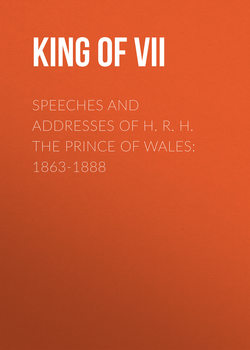Читать книгу Speeches and Addresses of H. R. H. the Prince of Wales: 1863-1888 - King of Great Britain Edward VII - Страница 29
FOREIGN TOUR, 1868-1869
ОглавлениеNovember 17th, 1868-May 13th, 1869
There is a long break in the record of proceedings or speeches on account of the Foreign Tour on which the Prince started in November 1868, returning in May 1869. Of this time of travel it is not necessary to say much here, as the chief events and incidents are before the public in various works. Full reports appeared in the Times, and other journals, during the movements of the Royal party on the Continent, in Egypt, and Palestine. Reference is made to this interesting and memorable tour in several of the speeches made by the Prince after his return; and at a later time, as when he spoke at the meeting about the neglect of the Crimean graves, and at that for the memorial to Dean Stanley.
Only one incident of the tour, and the one of greatest historical interest, may be mentioned, the visit to the Cave of Machpelah and the Sepulchres of the Patriarchs. In this event, not only the personal interest, but the national importance of the Prince's Eastern Tour, may be said to culminate. Never before had Christian pilgrims, since the days of the Mohammedan conquest, or of the Crusades, been allowed to see so much of the holy tombs of the Patriarchs. The sanctity with which the Mussulmans have invested the place is a living witness of the unbroken veneration with which men of Jewish, Christian, and Mohammedan creeds have honoured the memory of Abraham, the father of all the faithful. Hebron is known among the native population by no other name than El-Khalil, the Friend of God.
It was the high position of the Prince of Wales, as son of Queen Victoria, that obtained for him the rare privilege of access to this sacred spot. Nor was it obtained for him without some difficulty. Mr. Finn, the English Consul at Jerusalem, prepared the way by requesting an order from the Porte; and the reply of the Grand Vizier left the matter very much to the discretion of the Governor, the Pasha of Jerusalem. He gave his consent on the condition that only a small number should accompany the Prince; and precautions were taken that the experiment should be made with as little risk as possible. The approach to Hebron was lined with troops, and guards were posted on the house-tops, in case of any outbreak of fanatical opposition to entering the holy places. A guard attended the Prince up to the entrance of the sacred enclosure. Even then two of the Arab Sheiks were inclined to give annoyance, but these the Governor of Hebron ordered out, or rather escorted them out himself, and the remainder were very courteous and complimentary to the Prince, saying that they were glad to have the opportunity of showing any civility in their power to one of the Princes of England, to whom their Government and people were so much indebted for kind offices.
Dr. Rosen, well known to travellers in Palestine for his knowledge of sacred geography, was fortunately one of the party admitted, and he was able to make a ground plan of the platform. This, with the observations recorded by another of the Prince's party, has given clearer knowledge of this world-renowned spot. The existence and exact situation of the cave, the views of the enclosure within and without, the relation of the different tombs to each other, and the general conformity of the traditions of the mosque to the accounts of the Bible, and of the early travellers, were now, for the first time, clearly ascertained.
The Prince's visit was on the 7th of April, 1869. The story of the visit spread throughout the lands of Islam; and therefore this one incident of the Prince's Eastern Tour is here referred to as showing its national importance, and that the prestige of England is still great in these lands. But we must resume the record of speeches in England, where it so happens that the first of consequence was made at a meeting of the Royal Geographical Society.
